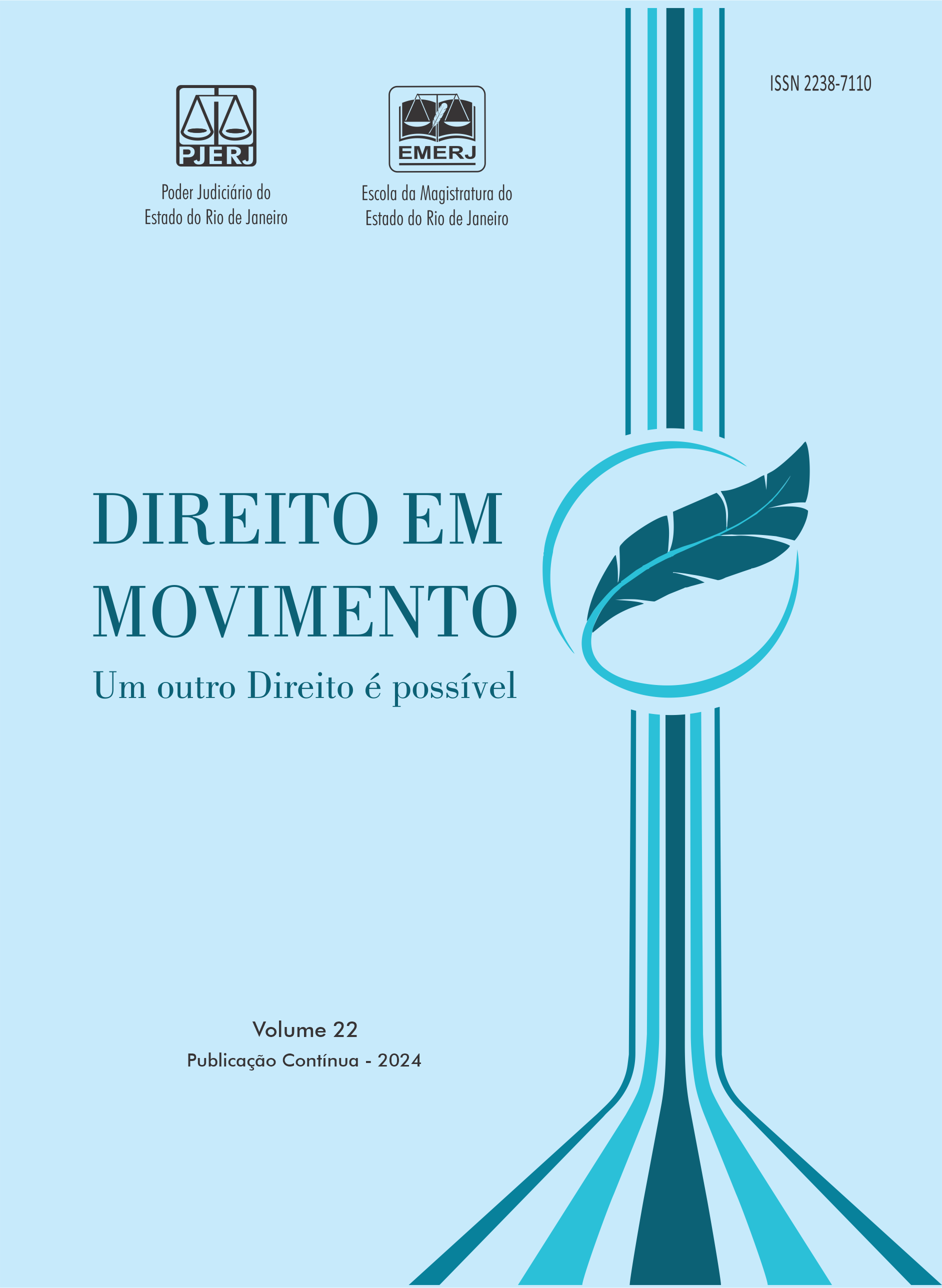G.D. always felt like E.
the use of social names as an expression of human dignity
Keywords:
transsexuals, gender performance, social nameAbstract
The use of the social name by transsexual individuals is a fact that escapes the sociological studies of gender identity, having relevance in juridical relationships. This article aims to discuss how gender performance with the use of the social name is crucial for the affirmation of the identity and the guarantee of the dignity of the human person to the transsexual individuals. Using as main theoretical basis, Butler (2017) and Preciado (2019), we will analyze the judicial decision rendered by the Court of Justice of Rio de Janeiro (TJRJ), which granted the right of the individual designated as "GD" to be recognized by the appropriate social name gender identity as "E". The methodology of this research combines theoretical analysis and case study, adopting a solid approach that integrates literature review and case law analysis.
References
BRASIL. Projeto de Lei n. 5002/2013. Dispõe sobre o direito à identidade de gênero e altera o art. 58 da Lei nº 6.015 de 31 de dezembro de 1973. Brasília, DF: Câmara dos Deputados Federais, 2013. Disponível em: https://www.camara.leg.br/proposicoesWeb/fichadetramitacao?idProposicao=565315. Acesso em: 21 jul. 2023.
BRASIL. Lei n. 10.406, de 10 de janeiro de 2002. Institui o Código Civil. Brasília, DF: Presidência da República, 2002. Disponível em: https://www.planalto.gov.br/ccivil_03/leis/2002/l10406compilada.htm. Acesso em: 08 nov.2024.
BRASIL. Supremo Tribunal Federal. Ação Direta de Inconstitucionalidade n. 4275. Direito constitucional e registral. Pessoa transgênero. Alteração do prenome e do sexo no registro civil. Possibilidade. Direito ao nome, ao reconhecimento da personalidade jurídica, à liberdade pessoal, à honra e à dignidade. Inexigibilidade de cirurgia de transgenitalização ou da realização de tratamentos hormonais ou patologizantes. Relator: Ministro Marco Aurélio, 01 de março de 2018. Disponível em: http://portal.stf.jus.br/processos/detalhe.asp?incidente=2691371. Acesso em: 20 jun. 2023.
BRASIL. Supremo Tribunal Federal. Recurso extraordinário n. 670.422. Direito Constitucional e Civil. Transexual. Identidade de gênero. Direito subjetivo à alteração do nome e da classificação de gênero no assento de nascimento. Possibilidade independentemente de cirurgia de procedimento cirúrgico de redesignação [...]. Relator: Ministro Dias Toffoli, 15 de agosto de 2018. Disponível em: http://portal.stf.jus.br/processos/detalhe.asp?incidente=4192182. Acesso em: 20 jun. 2023.
BUTLER, Judith. Problemas de gênero: feminismo e subversão da identidade. São Paulo: Civilização Brasileira, 2017.
FERMENTÃO, Cleide Aparecida Gomes Rodrigues; SILVA, Tatiana Manna Bellasalma e. O direito ao esquecimento como garantia da dignidade da pessoa humana na sociedade superinformacional: a quem pertence o passado? In: FIUZA, César Augusto de Castro; SILVA NETO, Orlando Celso da; RODRIGUES JUNIOR, Otavio Luiz (org.). Direito Civil Contemporâneo II. Florianópolis: CONPEDI, 2015. Disponível em: http://site.conpedi.org.br/publicacoes/66fsl345/oy1ux21y/94NWsXt97fP0yDGE.pdf. Acesso em: 22 maio 2023.
JESUS, Jaqueline Gomes de. Orientações sobre a população transgênero: conceitos e termos, Brasília: Abril, 2012.
LAURETIS, Teresa de. Teoria queer, 20 anos depois: identidade, sexualidade e política. In: HOLANDA, Heloisa Buarque de. Pensamento feminista: conceitos fundamentais. Rio de Janeiro: Bazar do Tempo, 2019.
PEREIRA, Andira Ramos; SAMPAIO, Juliana Lira; ALENCAR, Luis Carlos de. Sobreviver não basta: a moenda da opressão. In: GEISLER, Adriana Ribeiro Rice. Protagonismo trans: política, direito e saúde na perspectiva da integridade. Niterói: Alternativa, 2015.
POMPEU, ANA. STF autoriza pessoa trans a mudar nome mesmo sem cirurgia ou decisão judicial. Consultor Jurídico, [S.l.], 1 mar.2018. Disponível em: https://www.conjur.com.br/2018-mar-01/stf-autoriza-trans-mudar-nome-cirurgia-ou-decisao-judicial. Acesso em: 20 jun.2023.
PRECIADO, Paul B. Multidões queer: notas para uma política dos “anormais”. In: HOLANDA, Heloisa Buarque de (org.). Pensamento feminista: conceitos fundamentais. Rio de Janeiro: Bazar do Tempo, 2019.
PRECIADO, Paul B. O que é contrassexualidade? In: HOLANDA, Heloisa Buarque de (org.). Pensamento feminista: conceitos fundamentais. Rio de Janeiro: Bazar do Tempo, 2019.
PRINCÍPIOS de Yogyakarta: princípios de Yogyakarta sobre a aplicação da legislação internacional de direitos humanos em relação à orientação sexual e identidade de gênero. Joguejacarta, [2016]. Disponível em: https://www.clam.org.br/uploads/conteudo/principios_de_yogyakarta.pdf. Acesso em: 27 jul. 2023.
SMITH, Andreza do Socorro Pantoja de Oliveira. Diversidade sexual e proteção integral à infância e juventude no Direito Internacional. Rev. Direito e Práx., [S.l.], v. 10, n. 2, abr./jun. 2019. Disponível em: https://doi.org/10.1590/2179-8966/2019/40412. Acesso em: 27 jul. 2023.
RIO DE JANEIRO (Estado). Tribunal de Justiça do Estado do Rio de Janeiro. Apelação n. 0030459-21.2016.8.19.0001. Desembargador José Carlos Paes, 24 de novembro de 2017. Disponível em: http://www4.tjrj.jus.br/ejud/ConsultaProcesso.aspx?N=2017.001.68932. Acesso em: 25 jun. 2023.
VIEIRA, Helena; BAGAGALI, Bia Pagliarini. Transfeminismo. In: HOLANDA, Heloisa Buarque de. Explosão feminista: arte, cultura, política e universidade. São Paulo: Cia das Letras, 2018.
Downloads
Published
How to Cite
Issue
Section
License
Copyright (c) 2024 Silvia Campos Paulino

This work is licensed under a Creative Commons Attribution 4.0 International License.
Authors who publish in this Journal agree to the following terms:
- Authors retain copyright and grant the Journal of Constitutional Research the right of first publication with the article simultaneously licensed under the Creative Commons - Attribution 4.0 International which allows sharing the work with recognition of the authors and its initial publication in this Journal.
- Authors are able to take on additional contracts separately, for non-exclusive distribution of the version of the paper published in this Journal (eg.: publishing in institutional repository or as a book), with a recognition of its initial publication in this Journal.
- Authors are allowed and encouraged to publish their work online (eg.: in institutional repositories or on their personal website) at any point before or during the submission process, as it can lead to productive exchanges, as well as increase the impact and the citation of the published work (see the Effect of Open Access).

















